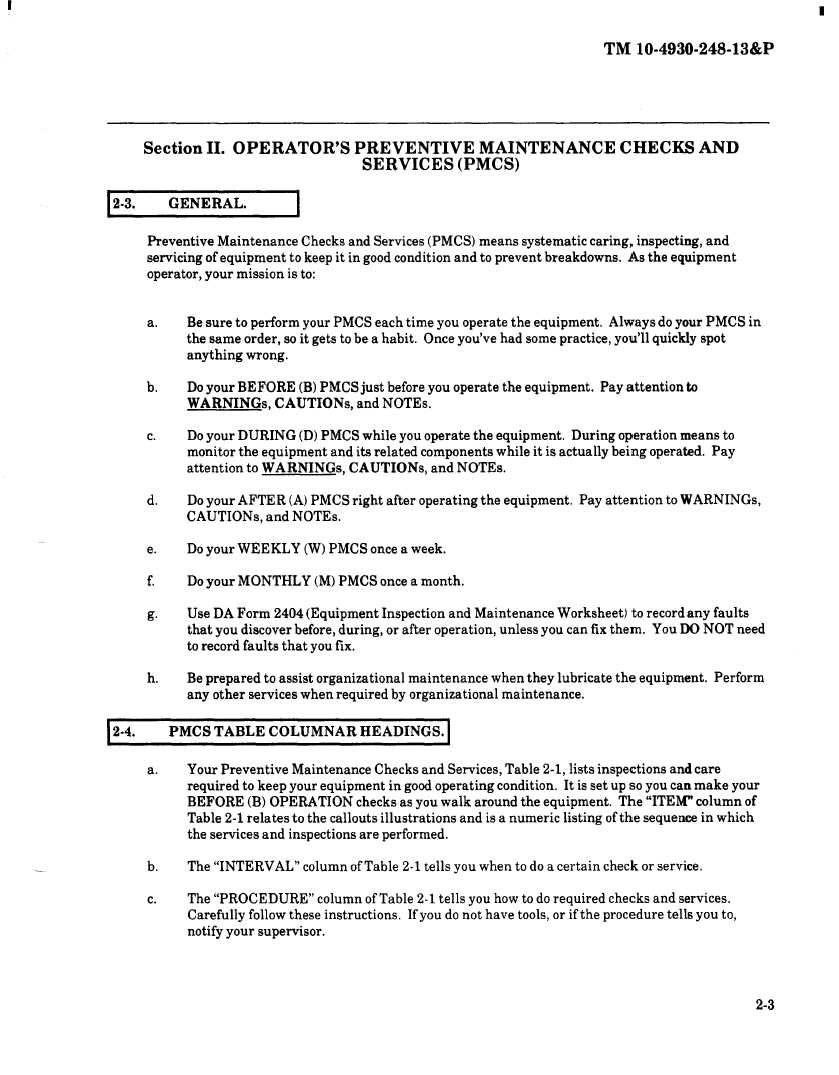|
| |
TM 10-4930-248-13&P
Section II. OPERATOR'S
PREVENTIVE
MAINTENANCE
CHECKS
AND
SERVICES
(PMCS)
2-3.
GENERAL.
I
Preventive
Maintenance
Checks and Services (PMCS) means systematic
caring, inspecting,
and
servicing
of equipment
to keep it in good condition
and to prevent
breakdowns.
As the equipment
operator,
your mission
is to:
a.
Be sure to perform
your PMCS each time you operate
the equipment.
Always do your PMCS in
the same order, so it gets to be a habit.
Once you've
had some practice,
you'll quickly spot
anything
wrong.
b.
Do your BEFORE
(B) PMCS just before you operate
the equipment.
Pay attention
to
WARNINGS,
CAUTIONS,
and
NOTES.
C.
Do your DURING
(D) PMCS while
you operate
the equipment.
During
operation
means
to
monitor
the equipment
and its related
components
while
it is actually
being
operated.
Pay
attention
to WARNINGS,
CAUTIONS,
and NOTES.
d.
Do your AFTER
(A) PMCS right
after operating
the equipment.
Pay attention
to WARNINGS,
CAUTIONS,
and NOTES.
e.
Do your WEEKLY
(W) PMCS once a week.
f.
Do your MONTHLY
(M) PMCS once a month.
9.
Use DA Form
2404 (Equipment
Inspection
and Maintenance
Worksheet)
to record any faults
that
you discover
before,
during,
or after
operation,
unless
you can fix them.
You DO NOT
need
to record
faults
that
you fix.
h.
Be prepared
to assist
organizational
maintenance
when they
lubricate
the equipment.
Perform
any other
services
when
required
by organizational
maintenance.
2-4.
PMCS
TABLE
COLUMNAR
HEADINGS.
I
a.
Your
Preventive
Maintenance
Checks
and Services,
Table
2-1, lists
inspections
and care
required
to keep your equipment
in good operating
condition.
It is set up so you can make
your
BEFORE
(B) OPERATION
checks
as you walk
around
the equipment.
The "ITEM"
column
of
Table
2-1 relates
to the callouts
illustrations
and is a numeric
listing
of the sequence
in which
the services
and inspections
are performed.
b.
The "INTERVAL"
column
of Table
2-1 tells
you when
to do a certain
check or service.
C.
The "PROCEDURE"
column
of Table
2-1 tells
you how to do required
checks
and services.
Carefully
follow
these
instructions.
If you do not have
tools, or if the procedure
tells you to,
notify your
supervisor.
2-3
|

